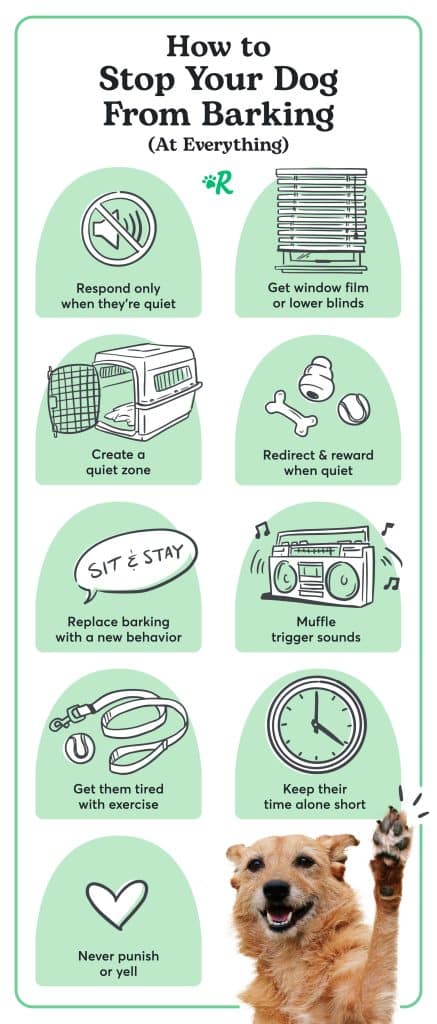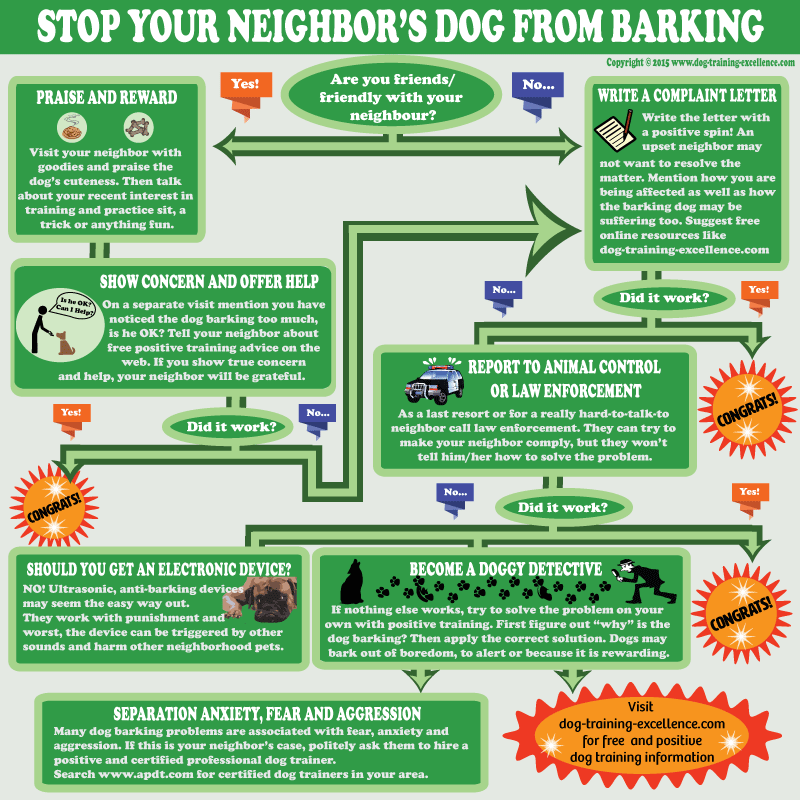Imagine settling down for a peaceful evening at home, but instead of tranquility, you’re greeted by the relentless barking of your neighbor’s dog. It’s frustrating, right?
You’re not alone. Many people face this noisy predicament, feeling trapped between maintaining peace with their neighbors and reclaiming the serenity of their own space. But don’t worry—there’s hope and a path forward. By understanding why the barking persists and exploring effective strategies to address it, you can restore quiet to your life without causing tension in your community.
Ready to find out how? Let’s dive into the solutions that can bring peace back to your doorstep.

Credit: www.rover.com
Assess The Situation
Dealing with a neighbor’s barking dog can be stressful. To address this, it’s important to first assess the situation. Understanding the root of the problem can guide your next steps effectively.
Begin by observing the dog’s behavior. This will help you gather important information. It will also prepare you for a constructive conversation with the owner.
Identify The Cause
Find out why the dog is barking. Dogs bark for many reasons. They could be hungry, bored, or anxious. They might even be trying to alert their owner to something. Pay attention to what triggers the barking. Look for patterns or specific events that cause it.
Consider the time of day the barking happens. Is it during the owner’s absence? This might indicate separation anxiety. Maybe the barking happens at night. This could suggest the dog is reacting to noises outside.
Determine The Frequency
Take note of how often the dog barks. Is the barking constant or occasional? Frequent barking may indicate a deeper issue. It might require a different approach than infrequent barking.
Keep a log of the barking. Record the times and duration. This log can be helpful later. It provides a clear picture of the problem. It also serves as evidence if you need to discuss the issue with your neighbor.
Understanding the frequency helps determine how serious the situation is. It also informs whether further action is needed.

Credit: arerofast.com
Communicate With Your Neighbor
Dealing with a noisy neighbor’s dog can be frustrating. The constant barking disrupts your peace and leaves you feeling helpless. But before you escalate the issue, consider communicating with your neighbor. A simple conversation might resolve the problem more effectively than you think. Here’s how to approach it thoughtfully.
Choose The Right Time
Timing is everything. Catching your neighbor when they’re rushing off to work or dealing with personal stress might not yield the best results. Instead, opt for a time when they’re relaxed and not preoccupied with other tasks. Maybe when you see them tending to their garden or unwinding in the evening. This way, you set the stage for a more receptive discussion.
Think about a time when you were approached unexpectedly. How did it make you feel? It’s likely you were caught off guard. Choosing the right moment can be the key to a successful resolution.
Be Polite And Friendly
Approaching the situation with kindness can make a world of difference. Start the conversation with a friendly greeting and show empathy for their situation. You never know; they might be unaware of the barking issue. A simple “I hope you’re doing well” can ease any tension.
Consider how you would want to be approached if the roles were reversed. A little politeness can go a long way. It’s not just about what you say, but how you say it. Your tone can influence the outcome positively.
Would you feel comfortable if someone approached you with a complaint? Your neighbor likely feels the same way. Being polite opens the door to a constructive dialogue.
Communicating effectively with your neighbor can be the stepping stone to resolving the barking issue. Remember, a thoughtful approach can prevent future misunderstandings and foster a better neighborhood relationship.
Suggest Practical Solutions
Talk to your neighbor about the barking dog in a friendly manner. Suggest creating a routine to manage the dog’s barking. Offer to help find solutions, like training or a behavior specialist.
When your neighbor’s dog won’t stop barking, it can feel like an endless challenge. But before you start feeling helpless, remember there are practical solutions to help you regain peace. From soundproofing your home to encouraging behavioral training for the dog, there are steps you can take to address the issue without causing friction with your neighbors.Soundproofing Tips
Soundproofing your home can be a simple yet effective way to minimize the impact of a barking dog. Consider adding heavy curtains or drapes to windows. They not only block sound but also add an aesthetic touch to your space. Seal any gaps around windows or doors with weatherstripping. This can prevent noise from entering your home. If you’re a DIY enthusiast, you might enjoy creating your own soundproofing panels using materials like foam or dense fabric. Reflect on how creating a quieter environment could improve your daily routine. Could it make your home office more productive or your evenings more restful?Behavioral Training Ideas
Engaging with your neighbor about possible behavioral training for their dog can be a sensitive topic. Approach the conversation with understanding and empathy. Suggest resources like local dog trainers or online courses that focus on reducing excessive barking. Offer to help by researching reputable trainers or sharing contact details. Often, dogs bark due to boredom or lack of exercise. Propose simple solutions like more regular walks or playtime. Have you ever considered how adding a bit of community spirit could make living conditions better for everyone involved? Sharing in a solution could strengthen your relationship with your neighbor and improve the dog’s life.Utilize Noise Control Devices
Constant barking from a neighbor’s dog can be frustrating. It disrupts peace and quiet. Noise control devices might help regain tranquility. These tools can ease the stress caused by the barking.
White Noise Machines
White noise machines are effective in masking unwanted sounds. They produce soothing sounds that drown out barking. Place them near windows or areas where noise is loudest. These machines are simple to use and widely available. Many offer various sound options to suit preferences. Some emit sounds like rain or gentle waves. They create a peaceful atmosphere in your home.
Dog Silencer Devices
Dog silencer devices are specially designed for persistent barking issues. They emit ultrasonic sound waves that dogs find unpleasant. Humans can’t hear these sounds, so they won’t disturb you. Place them in the direction of the barking dog. The sound discourages the dog from continuing to bark. Many devices are portable and easy to set up. Choose one with a good range to cover the required area. Ensure it suits your specific situation and environment. Read reviews and compare features before purchasing.
Engage Community Resources
Seek local community resources to address persistent barking. Contact animal control or neighborhood associations for advice and support. Engaging a mediator can help resolve issues peacefully and effectively.
Dealing with a neighbor’s dog that won’t stop barking can test your patience. But before you let frustration take over, consider reaching out to community resources. These resources are there to help resolve conflicts and ensure a peaceful environment for everyone involved. By engaging community resources, you can address the issue in a constructive way without escalating tensions with your neighbor.Mediation Services
Mediation services can be a great starting point. They provide a neutral ground where you and your neighbor can discuss the issue with the help of a trained mediator. Consider attending a session to express your concerns and listen to your neighbor’s perspective. You might discover that they were unaware of the problem or unsure how to address it. A friend once resolved a similar issue by using a local mediation service. Both parties left the meeting with a better understanding and a plan to reduce the noise. Could this approach work for you?Local Animal Control
If mediation doesn’t help, local animal control might be your next step. Animal control officers are trained to handle situations involving noisy pets. They can assess whether the barking violates any noise ordinances or animal welfare guidelines. This doesn’t have to be a confrontational step; think of it as ensuring the well-being of the dog and the community. Before reaching out, check your city’s website for contact details and procedures. By taking this step, you show that you are serious about finding a solution while considering the legal aspects. Involving community resources can turn a frustrating situation into an opportunity for positive change. What actions will you take to restore peace in your neighborhood?
Credit: www.pinterest.com
Legal Options
Dealing with a neighbor’s noisy dog can be frustrating. If friendly talks fail, legal avenues may be your next step. There are specific legal options to explore. These can help resolve the situation effectively.
Review Noise Ordinances
Local noise ordinances are rules set by your city. They define acceptable noise levels. Check these ordinances to see if the barking violates them. Cities have different rules, so verify what applies to your area. Noise ordinances often outline quiet hours. During these times, noise must be reduced. If your neighbor’s dog barks during quiet hours, you may have a case. Document the barking with notes and recordings. This evidence supports your complaint to authorities.
Consider Small Claims Court
Small claims court is another option. It addresses minor disputes, including noise complaints. This court allows individuals to seek justice without a lawyer. Presenting your case requires proper documentation. Keep a detailed record of the barking incidents. Include dates, times, and any attempts to resolve the issue. This strengthens your case in court. Judges often favor well-documented claims. A ruling in your favor may lead to compensation or a court order to reduce noise.
Frequently Asked Questions
How Can I Talk To My Neighbor About Their Barking Dog?
Approach your neighbor politely. Express your concerns. Suggest possible solutions. Focus on cooperation and mutual respect.
What Are Some Humane Ways To Stop Dog Barking?
Use soundproofing techniques. Consider white noise machines. Try dog-friendly sound barriers. Ensure the dog is comfortable and well-cared for.
Can I Report A Barking Dog To Authorities?
Yes, contact local animal control or neighborhood association. Keep records of incidents. Provide details for effective action.
Are There Legal Actions For Persistent Dog Barking?
Check local noise ordinances. Consult legal advice if needed. Laws vary by location. Legal action should be a last resort.
How Can Technology Help With Dog Barking?
Use noise-cancelling devices. Install soundproof windows. Explore apps to monitor noise levels. Technology offers practical solutions.
Conclusion
Dealing with a neighbor’s barking dog can be frustrating. Start by talking calmly to your neighbor. Express your concerns clearly. Sometimes, they might not realize the problem. Offer solutions like training or a visit to the vet. If the noise continues, contact local authorities for help.
Remember, patience and understanding go a long way. Building a good relationship with your neighbor benefits everyone. Peaceful solutions create a better neighborhood. Stay calm, and work together for quiet nights.





